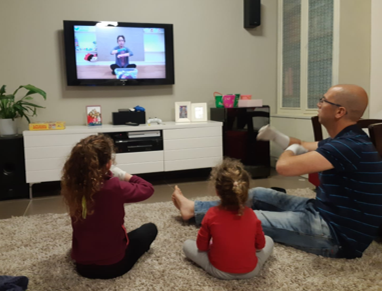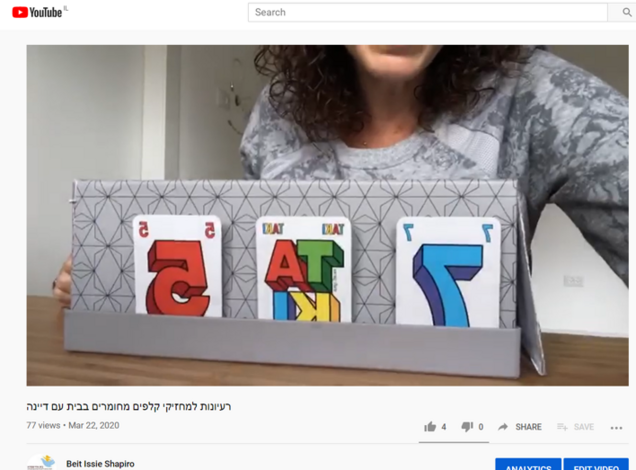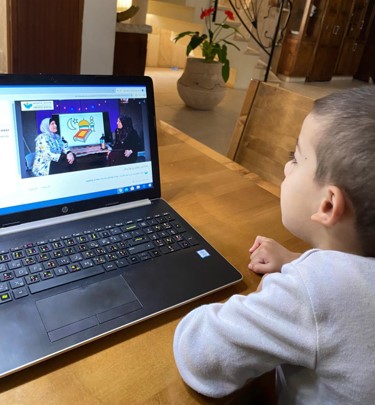Virtual Education and Therapy during COVID-19: An Immediate Solution to an Unexpected Challenge

Name of practice: Virtual Education and Therapy at Beit Issie Shapiro during COVID-19: An Immediate Solution to an Unexpected Challenge
Organisation: Beit Issie Shapiro
Description of the organisation: Beit Issie Shapiro is Israel’s leading developer and provider of innovative therapies and services for children and adults across the entire range of disabilities impacting on over half a million people annually.
Beit Issie Shapiro promotes social change though a three-pronged approach: development and provision of cutting-edge services, changing attitudes in society and advocating for better legislation, and sharing knowledge throughout Israel, as well as internationally, through research, consultation and training.
Country: Ra’anana, Israel
Year of Initiation: 2020
Funding: Beit Issie Shapiro’s own funds and fundraising efforts
Link to UNCRPD: Article 7 – Children with disabilities, Article 24– Education, Article 30 – Participation in cultural life, recreation, leisure, and sport
Description of practice: When the COVID-19 pandemic struck Israel, a major priority of Beit Issie Shapiro was to provide immediate support to children with disabilities and their parents by creating “virtual schools”. The goal was to provide support to the families, offer social opportunities for the children and maintain a semblance of a daily educational and therapeutic routine.
Problem targeted: Israel has experienced three national lockdowns due to the COVID-19 pandemic and this situation has been tough for many. For families of children with disabilities it has been even more difficult as they often require one-to-one supervision or assistance to complete daily activities. The challenge was to provide the families with solutions that would support the children’s participation in educational and therapeutic activities whilst simultaneously addressing the social and emotional needs of the children and families. Given their lack of prior experience with online therapy or education, it was necessary to develop solutions that would be easy to implement yet also provide adequate, appropriate, and accessible support for the children.
Solution offered: As part of the virtual school programme, three YouTube channels containing hundreds of videos in Hebrew and in Arabic were launched. Each channel included a range of activities such as morning circles, language and math lessons, and therapeutic activities. Videos were created by educational and therapeutic staff. The videos were often accompanied by complementary activities, with extra materials being sent to the families in a variety of formats to accommodate their accessibility needs.
Parents also received direct support and training from their child’s teachers and therapists on several topics including the use of assistive equipment, ideas for leisure and educational activities to support active participation in the home environment.
To reduce the learning curve needed to adjust to the online learning environment, the programme was based on mainstream technologies and software that families and students were already familiar with. It was also deemed necessary to provide opportunities for online social interaction and effective ideas for play and leisure activities at home. This supported families to endure the long hours at home.
Impact generated by the practice: The ‘virtual schools’ provided a much-needed online learning solution for families of children with disabilities, taking into consideration the varied and complex needs of our students and the varied availability and skill of the parents at home.
YouTube statistics highlighted that the original ‘virtual school’ playlists reached over 450,000 views in total since March 2020. Additionally, Beit Issie’s latest video series provides a virtual summer programme for very young children on a mainstream TV channel. The 11 videos released so far in this project have received over 22,000 views in total.
Sustainability of the practice: To encourage information sharing, the practice has been shared with professionals located in Israel and abroad, motivating others in the field to focus on remote learning and therapy for young children with disabilities.
The practice has already been scaled up both nationally and internationally. Following this successful project, Israel's primary cable company, HOT, partnered with Beit Issie to produce additional videos which are also available on their Video-on-Demand channel and to be broadcast on two regular children’s channels. The videos are directed at all young children but include elements to address the needs of children with disabilities, so that children of all abilities can enjoy the programming together, furthering Beit Issie’s work to improve inclusion of children with disabilities in the wider community.
Contact Information:
Sharon Yeheskel-Oron, Manager of Global Professional Development: sharony@beitissie.org.il
Additional links:
Webinars:
- Special Needs in Special Times (56 min onwards)
- EASPD Webinar - Service Providers Moving to Online Support during the COVID-19 pandemic (15 min onwards):
YouTube playlists:
- The Virtual School (Hebrew) playlist
- The Virtual Kindergarten at De Lowe Center (Hebrew)
- The Issie Kindergarten (Hebrew)
- The Virtual Kindergarten at Sindian Center (Arabic)
- Beit Issie Shapiro's Virtual School (English)





